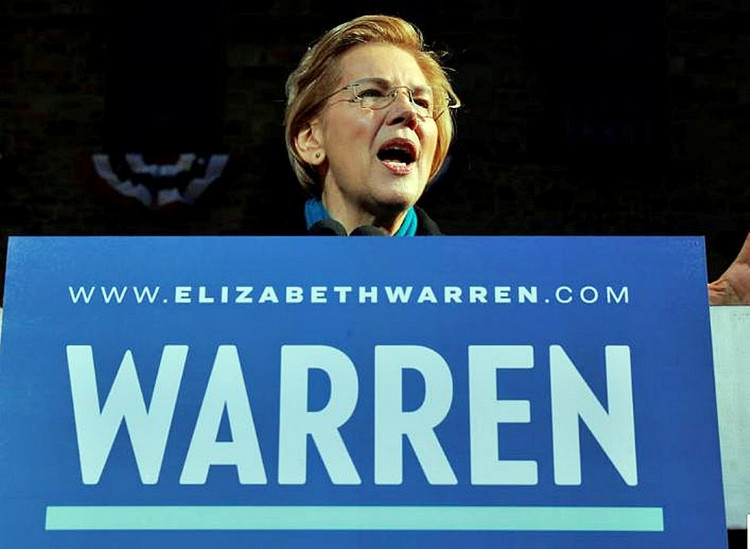Sen. Elizabeth Warren (D-MA), one of the five Democrats with a realistic chance of becoming the Democratic Party's nominee for U.S. president, warns another crippling economic recession is on the horizon unless the United States government takes swift action to counter it.
"Warning lights are flashing," wrote Warren in a post published on the internet site, Medium, on Monday. "Whether it's this year or next year, the odds of another economic downturn are high -- and growing."
In 2003, Warren predicted subprime mortgage lending would lead to a recession. Her prediction came true in 2008 when the Great Recession ravaged countries worldwide. Her claim to have predicted the Great Recession received a "True" rating from PolitiFact.
In her article, Warren also points out U.S. household debt has now exceeded previous records set before the Great Recession in large part because of stagnant wages and rising student loan, credit card, and auto loan debt.
Corporate debt (especially lending to companies with already high levels of debt) is rising to new heights. Warren correctly pointed out aggregate levels have increased.
Non-housing debt jumped from $2.63 trillion in mid-2009 as the Great Recession was ending to $4.02 trillion as of the end of the first quarter of 2019, an increase of 52.8 percent, according to New York Federal Reserve data.
Total non-financial corporate debt stands at a massive $6.4 trillion, or 73 percent higher since the end of the Great Recession. Economists are increasingly concerned about the poor credit quality among borrowers who have taken advantage of low rates to accumulate massive amounts of debt.
The U.S. national debt, which comes to $22 trillion and counting, is expected to exceed GDP in the years ahead.
"I see a precarious economy that is built on debt -- both household debt and corporate debt -- and that is vulnerable to shocks," said Warren. "And I see a number of serious shocks on the horizon that could cause our economy's shaky foundation to crumble."
Reducing debt might hold off the oncoming recession.
Warren has proposed raising the minimum wage to $15 an hour to reduce massive household debt. She also wants to ban so-called "right-to-work" laws favored by Republicans; ensure equal pay for women of color, and cancel up to $50,000 in student loan debt for 95 percent of the people who have it. Right-to-work laws guarantee no person can be compelled to join a union or pay union dues as a condition of employment.
Warren also released plans to increase access to affordable housing and provide universal affordable childcare. She said these proposals will reduce costs for working families.
Warren also proposes to impose rules limiting leveraged corporate lending; investing in green manufacturing and limiting shocks to the economy by replacing "trade-war-by-tweet" with a coherent trade strategy.
She also wants to do away with the debt limit altogether in favor of a system that automatically raises the debt limit to coincide with revenue and spending decisions made by Congress.
Warren also said "the country is now in a manufacturing recession," a claim that rankled Wall Street.






